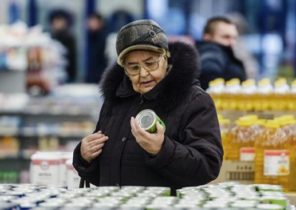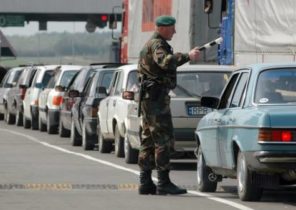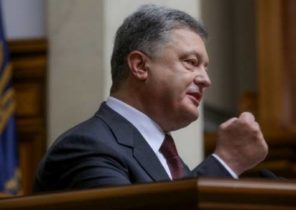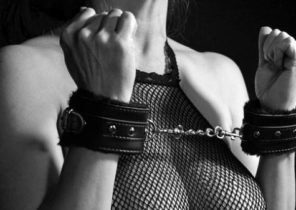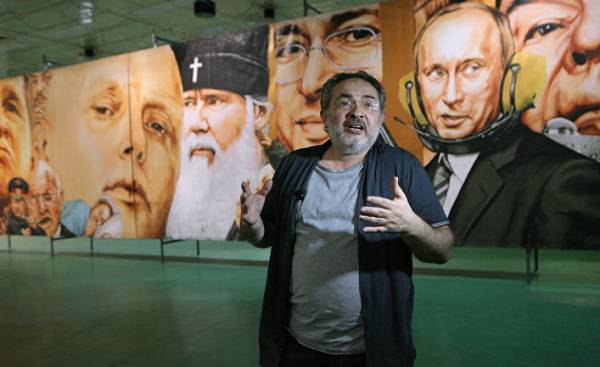
Russian political consultant, gallery owner and art Manager MARAT GELMAN arrived in Kiev to help select paintings by Ukrainian artists for the collection of the National center of art and culture Georges Pompidou in Paris. In the second part of an interview with “Apostrophe” he said, why the cultural situation in Ukraine is more favourable than in Russia why war is bad for art and how the Russians cope with the “embarrassment” with which they must live.
Apostrophe: what is the reason of your visit to Kiev? Meeting with like-minded people, start new projects, search of new names in Ukrainian art?
Gelman: In February of this year, I gave the Centre Pompidou-six works from his collection. In conversation with the Director of the Museum, we discovered that they have little in the collection of the Ukrainian artists, and most importantly — there is no information about them. That is, they have the collection includes Boris Mikhailov and Yury Leiderman, but these two artists were they in the line of Russian artists.
Anyway, today the Centre Pompidou is one of the two most important institutions in Europe, is not a French Museum, this Museum in Europe, is currently the Ministry of culture of Europe. I offered to correct the situation and introduced them to the Zenko Aftanaziv (collector, founder of Zenko Foundation, which promotes contemporary Ukrainian art — “Apostrophe”), cultural Fund of Ukraine, who mainly works in the West.
And now (the conversation took place in the first half of July, “Apostrophe”), together with Nicolas Lucci, Gutnikova, one of the leading curators of the Pompidou, I came here. We go, look at shops, institutions. The other day there was a big meeting with Ukrainian collectors, because of the Museum’s important to have those works which are done today, and earlier, which are not the artists, and in private collections. Collect pounds of catalogs in order to study this whole thing. And I hope that the autumn will begin this programme for the Ukrainian art can be extremely important. Once in the Centre Pompidou, and the artists immediately fall in international traffic — thousands of curators from around the world, with some different ideas, form the exhibition very often from the collection of major museums. If you were in Paris and visited the library of the Centre Pompidou, you will know why this kind of station, where the curators come from all over the world. It is impossible to overestimate. I promised, if this process goes, then I’ll give, too, his collection of early some work.
— How do you assess cultural needs of the Ukrainian society now? Especially in such difficult socio-economic conditions.
— Looking to compare. If we compare with the Russian situation, of course, the good thing is do not interfere. In Russia in the cultural space actually there are military operations, the government is fighting with people of culture. Not shy, speaks openly and demonstrates that we have a war, and that we want to change people’s brains, we want to bayonet have equated a feather, we want to keep loyal people. Even if the artist is engaged in some very academic topic, like classical music, but also shows disloyalty to the government, so he’s in the enemy camp. In this sense, in Ukraine, of course, better. But so far it’s the only thing better.
It is clear that since here the war continues, the popular Patriotic guide, as it is known, usually for the benefit of art is not. We can divide these values or not, but the simplification of meaning in art is not good. Art is the complexity of the situation, and war is a simplification. Simplified meaning: friend — enemy, good — bad. Here yesterday I arranged a little evening he and Sasha Kabanova, my favorite poet, who lives here in Kiev. He has such a beautiful poetry… In the last turn should be a conversation about his political position because he is, from my point of view, the real cultural value. But he is facing a simplistic look at his work.
In General, my hypothesis is that to get rid of this can not be in Kiev, because Kiev is at war and therefore can not otherwise respond to culture. Therefore it is very important what is happening in Lviv. I would like to become an important what is happening in Kharkov, in Odessa, that is in other cities, in which there is no such Ukrainian themes. They should take on the role of the European cultural project.
With Nicolas yesterday we listened to a lot of people were artists, collectors, curators. And he said to me: “Listen, and why they so often say, “Ukrainian artists”?” In France it would be impossible. There is an artist name, the city where he lives. But no one says the “French artist”, because, God knows, it’s French or not French, maybe he’s from Palestine 20 years ago arrived. There is not emphasized national identity. Is belonging to the place, to the context. City context. When the artist says he is from Berlin, it is clear in what artistic context he or she lives. He meets with some critics, with some colleagues, exhibiting in some cities. When he says he’s German, it causes some suspicion.
— Do you agree that Ukrainians identification across the nation was always paramount? And to military events.
I just want to say that in Kiev, probably, it can’t be avoided. But identification through the nation looks weird for Europe.
There are people who believe that the processes must have the sequence: first you win the war — then do the culture. The fact that the first will win the war, then improving the economy, then build roads and so on… so When people say, I cite the example of the Renaissance. Do you think that the Renaissance was fed? There was not a single era in the history of mankind, when all were fed, someone said, “Now, when we fed people, let’s get culture”. We want all processes to run in parallel. And if we want the processes to run in parallel, and thus understand that we have what we have, then you need to go the path of decentralization.
— What does the line of decentralization for Ukraine in the cultural sphere?
— Line of decentralization for a country like Ukraine, is legislation that is necessary to change the legislation in the cultural area. In addition, we need the so-called cases of openness. Need to projects to allow Europe to these standards made of natural. It’s not just. Relatively speaking, it should be created some mechanism, some projects, tasks, for which they will come here. This is extremely important and good because outside of the main policy. It is clear that here, while they steal the money or will to kill people, it is difficult to talk about something else. But you can do some important work.
— What Ukrainian artists do you most impressed with lately?
— On the one hand, I know very well, and if someone forgets, then the resentment will start. But on the other hand, some young people I have not seen, yet familiar. In General I have the feeling that 90-e years — the most significant phenomenon. But at the same time already the children of those artists that was in the 90s, also manifest themselves. This is interesting. In General, the situation may not be very good in a quantitative sense, because in Europe today the artist is more a mass profession, than in Ukraine. But then the school makes itself felt. The lack of mass of the profession of the artist is always associated with the economy.
— And if to compare with Russia?
— In Russia this request even less. The fact that the post-industrial economy generates the profession of the artist as a mass. For example, the so-called business service free time. In the world now people are working three times less, than 50 years ago. This means that a large amount of free time on something is spent. And the city turned into a business for service free time. Two thousand years ago, the city was a safe place where you’re behind walls and hid from the enemy, and later the city became a trading place where you to change products, then the city was a place where you are looking for work, and now the city has become a place where you spend your free time. For example, the London family 17% of its budget spends on this is the most free time, music, visits to museums and so on. Not just for art and entertainment in General, but art is an important part of this business. Therefore, where post-industrial economy develops, dominates the industrial, the figure of the artist is significant and the artists getting more.
Europe today, it might still did not, but I’m sure will soon become a territory of art in different forms. Everywhere is art, particularly in business, is a different type of business to build. In General, a big change is coming in this regard.
— You say that Europe will be the territory of art overall, and what is the U.S. role in this process?
The future does not occur at the same time. We understand that when the bourgeois revolution took place in France, Italy had been in a feudal relationship. And so everywhere. I think that the post-industrial world will initially occur even not in Europe, but in countries with a pleasant climate, the Mediterranean or Australia.
The place in the industrial world took, for example, competition of corporations in the post-industrial will take the competition areas. If in the 20th century, we saw the competition Coca-Cola and Pepsi-Cola in the 21st century competition will be between Kiev and Prague, between Berlin and Paris, for example. This will be the main competition to compete will be at the place where the person now lives. It can work anywhere, so it chooses the place where it is better to spend your free time. And this competition will be the main plot in the near future. And the artist in the broadest sense plays a very important role in this competition. Exactly the same what the scientist played in the industrial world.
Now there is a transition from universal to unique things. Now corporations are fighting for are universal. If Apple has created an easy mechanism, then anyone who wants to create the same gadget, enters her in a competition. And if he does worse, he loses, it is not needed, the winner takes it all. The situation of art — a unique situation. If a novel by a writer, for example, “Harry Potter” became popular, on the contrary, it expands the space for the next writers who write in this genre. This is generally a different market in which there is a place for unique. If in the 20th century billionaires are companies that produce cameras, the 21st century billionaires are Directors who are on these cameras to make films. Cameras are getting cheaper, they almost did not earn. But if you make the product, and it will be billions, it is quite another thing. This is the difference and it turns out that in the production of the cameras main figure is a scientist, and in the production of film artist.
— You already mentioned the dominant role of the state in all spheres in Russia. How it affects cultural life? There are bad examples of this process, and there is good, as Zvyagintsev’s movie, for example.
— If in Soviet times, cultural life continued, if parsnips could work in Stalin’s time, then, of course, and now will continue. Another thing is that we can’t call this process a success, because we know those who survived, but do not know those who have not survived. Not have survived — and I mean disappeared, and in the sense that it became an official public follower.
In General, I see the problem. A person chooses their path in life. Here students of the officer schools see themselves as courageous people who resist. And the students of musical College studying art, they courage not required. And here suddenly there is a new situation which people in the arts takes courage. And from them as should be expected, they were not going to be masculine. It turns out that the main problem is conformism. No one here can not be blamed, because they wanted a different life. But overall, I think the situation is bad in it. Everything is poisoned with poison of conformity. People who are forced to work in the Tretyakov gallery and in similar institutions, every day faced with the awkward fact that they cooperate with the state, which… — and then a comma.
Here in Kyiv is Maria Kulikovskaya, during Manifesta (Biennale of contemporary art in Russia — “Apostrophe”), which was in the Hermitage in St. Petersburg, rolled up in a Ukrainian flag and lay down on the steps. It was a very important gesture, because all the people who came to Peter to “Manifesto”, I felt a little awkward. Okay, skip the “Manifesto” is impossible, this is very important in order to meet or meet up with old friends, to offer their projects, the cultural life of the world lives through such meetings. And this girl has reinforced this unease, lay to, God forbid, not forgotten. I think that is very important. In principle, all the people we love and appreciate who continue to work in Russia feel uncomfortable. And this poison of the conformism inherent.
But, on the other hand, I was clear that Moscow is a great city, more than Russia does. It has sort of its own cultural component, whether Putin or Shmutin. It’s such a club culture that does not depend on the state. And to break it failed, despite all attempts of the state. Today, I would say, in the background a poisoned Russian cultures are living organisms, as the St. Petersburg culture Moscow culture and urban culture. As for the major museums — Yes, they have political task is to overcome isolation. And this political task put on all sides. For example, the Minister of France may say, “Look, we’re fighting with Russia, but we don’t want all torn, so you’re here, please, Vasya, Vasya”. Large institutions with a high reputation is now fulfilling a political order, to show that isolation does not exist.
— How efficient is this mechanism works?
— Relatively efficiently. The fact is that if you take the different spheres of life in Russia — economy, politics, right — it appears that Russian art — the most integrated piece in the global context. In the humanitarian sphere, there is no lag, unlike technology. In this technological you can say: “Here, the Russian aircraft lagged behind for 30 years. Why cooperate with them? Let them, stealing our drawings to make their own and call it a substitution, it is their business”. And in the humanitarian sphere in General there is no concept of backlog. Any person who engaged in the art, starting from scratch and owns all of Humanities knowledge, wherever and what time it was born. In this sense, we have no backlog. Although we are in their circle all the time complain that we are poorly integrated, that we are not part of the European art that we don’t know. But with all this we are better integrated than any other sector of post-Soviet life.
— Another point of integration of art. Now we are increasingly banned the entry of artists who perform in the Crimea. How it will evolve?
— I believe that you to be interested in what will Russia do not need. It is important to understand how you will fill this niche. I am sure that a request to Russian culture only exists because there is a vacuum. Cultural exchange and culture is almost the identity. There is no one major city, which would live in their own cultural forces. Neither London nor Berlin will never make cities only at the expense of artists and musicians born in London and Berlin. Need a cultural exchange. Another issue is that cultural exchange is such a energy consuming thing, and you need to understand where to take this energy. Or need some elegant, beautiful technology that allow you to do it without money. For example, Sarajevo is a village with village leadership. But there were two people — the Director of the local muzeychik and another businessman, who managed to make it so that the leading artists to come and and give their product. You have no money — but you have something different you new. We need to make sure to have filled the vacuum.
I’m currently working in Montenegro. In the cultural sense, Montenegro has long been a province of Serbia. Children were sent there to learn, artists and musicians have made a career in Belgrade. Marina Abramovic (performance artist — “Apostrophe”) — Montenegrin, but has lived all his life in Belgrade. They need some technology way out of this situation, they are already a separate country, they may not be so much influenced by the neighbor. Montenegro has energy enough to own some kind of cultural conduct policy, the strategy therefore is that we as a province many cities. Belgrade? OK, we province of Belgrade. Berlin? Berlin. Vienna? Vienna. Moscow? Moscow. This is not an option, of course, for Ukraine, because Montenegro is tiny. But for Ukraine, too, need to think of some strategy to fill this vacuum.
— Do not you think that the same ban on the entry of Russian musicians has already helped Ukrainian culture to refocus on the European product?
I can’t tell you for sure. For example, “DakhaBrakha”. Love them. A producer from new York who is well knows, did not know that they are from Ukraine. They are outside the boundaries already.
— Poisoned atmosphere in Russia, many of whom were forced to leave?
— On the one hand, few people, and on the other hand, significantly. Vladimir Sorokin is calling to Berlin, it’s been finally settled. The main writer. It is clear that thousands of writers remained, and one left. Of course, a little. The fact that we are still products of the Soviet system, and this infantilism inherent in us. The fear of losing in a state or country, in the form of language some strong support very large. For the average person is great, but for a human culture, really terrible. Russian art and literature — centric. And, unfortunately, this conformity was a surprise to me. I honestly didn’t think it would. I thought all the power broken all to build, because of the bright and interesting people got in the 90-ies of the vaccine independence. But this did not happen.
— Why?
We have much to discuss. You know, I usually say: “Let’s talk, why in 1933 the Germans so Hitler happened.” It does not matter to the scholar and to the psychologist, you know. The same applies to the whole country that happens to people. This is a medical problem, from my point of view.
This awkwardness, you live in the awkwardness of year, you live in the awkwardness of two years, and then you’re trying to make this situation smooth. But they got it. The fact of the matter is. I recently visited, I spoke at Geek Picnic (popular science festival, dedicated to modern technologies, science and creativity — “the Apostrophe”), an interesting urban youth audience. In parallel, people-watched, so they do not see, many already settled in another way. I now like Maria Kulikovskaya, which lies on the steps. I am the reminder that they are in an awkward situation. Then I can simply bypass.
— Your job in Montenegro cultural changes color there?
— When you’re in Russia or in Ukraine, you work in Russia or in Ukraine. When you are in Montenegro, you’re working in Europe. We have the European cultural centre, which is located in the city of Kotor in Montenegro. Accordingly, I do exhibitions in Vienna, London and so on. Of course, the Montenegrin cultural component is present more than, for example, Serbian or Croatian, but just because she’s around. But I have not Montenegrin cultural center, I have a European cultural center, in which the Montenegrins — quarter. And rightly so. And, moreover, with the Montenegrins, I began to work only in the second year.
If you want to create an international institution, it is a mistake to take the national institution and just intersperse in it, to integrate international. On the contrary — we need to take international and to do something a little more comfortable for the locals.
— And many Ukrainians in the center?
Yes. Recently there appeared a new star little in Montenegro, she moved with her husband five years ago, a very talented artist, Victoria Krivanec. And here we made her show more.
Then we worked with the Kharkiv Foundation Feldman, who established an art prize, and the prize was an internship at our residence for three artists. Yura Solomko did we project, Sasha Makarska, Igor Gusev, his international career began in fact from Montenegro. It’s Europe. Made a discovery Gusev — came to the gallery from Vienna, came the Director of the Istanbul Museum. Although Istanbul everything is bad right now, Turkey is moving towards Iran. It was interesting, bright secular country, and now this religious fundamentalism. Leave out the curators. Too bad, because for the Balkans, Istanbul has been the avant-garde. And here before our very eyes this story ends.
